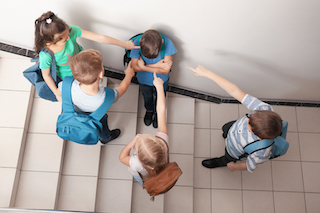 Bullying is something parents worry about throughout the school year. You don't want your child to be bullied or have your child do any kind of bullying. Now, a new study, titled, Understanding the relationship between youths’ belonging and bullying behavior: An SEM Model, recently published in the journal of Educational and Child Psychology, showed that school belonging and family belonging have a significant direct and indirect relationship with student bullying behavior.
Bullying is something parents worry about throughout the school year. You don't want your child to be bullied or have your child do any kind of bullying. Now, a new study, titled, Understanding the relationship between youths’ belonging and bullying behavior: An SEM Model, recently published in the journal of Educational and Child Psychology, showed that school belonging and family belonging have a significant direct and indirect relationship with student bullying behavior.
“The goal of our study was to more fully understand the relationship, if any, between sense of belonging and bullying behavior,” study author Dr. Christopher Slaten of the University of Missouri-Columbia told us. “Belonging has been linked to a myriad of academic and psychosocial outcomes, indicating generally that the stronger the sense of belonging for a child, the better their academic and psychosocial outcomes.”
According to the National Center for Educational Statistics, more than 20 per cent, or one out of every five students reports being bullied. Throughout the school year, students say they were bullied more than twice a month. Types of bullying include name calling, exclusion, being made fun of, rumor-spreading, and physical bullying such as pushing, tripping, and being spat on.
Prior to the current study, there had been no studies that directly tested whether or not there was a link between bullying behavior and belonging.
“Our thought based on previous literature was that there would indeed be a relationship,” Dr. Slaten told us. “The stronger the sense of belonging, the less likely a youth would be to engage in bullying behavior, which is indeed what we found.”
This has implications for schools and families and how we can make better attempts at designing interventions to help kids feel connected and welcome in educational spaces as well as at home, Dr. Slaten explained.
Anxiety and depression are just some of the effects of bullying according to the Centers for Disease Control and Prevention. Headaches and stomachaches are also a negative by-product of bullying. Dr. Slaten along with fellow author and researcher, Dr. Chad Rose, are both very passionate about school climate, which both bullying and belonging are a part of.
“As we have seen in the national news, there are considerable climate issues in schools across the country with rising concern about student suicidal ideation, violence against other students, safety and discipline, and of course bullying,” Dr. Slaten told us. “We believe that making adjustments to the climate can impact a student’s sense of belonging in school, which in turn impacts a myriad of different achievement and psychosocial outcomes, including in this study finding that it reduces students bullying behavior.”
Dr. Slaten and Dr. Rose found that the more a student feels connected at school, the less likely they are to engage in bullying behavior. Furthermore, if a student feels like they belong to their family, they are more likely to feel connected at school and therefore less likely to perform bullying behaviors as well. The only surprise result they found in their study was that peer relationships mattered less in relationship to school belonging and bullying behavior. The relationship still existed, it was just not as significant.
“The results of this study have significant implications for how we think about school climate and culture, and for how schools can support family dynamics as well,” Dr. Slaten told us. “When schools are able to provide interventions and an overall climate where students feel welcome and accepted, we postulate that there will be less bullying behavior. And at home, if students are able to feel connected to their families (parents, guardians, siblings) they are less likely to bully their peers. This last point is important because it empowers caregivers that they can provide an atmosphere at home that will impact their students approach to school.”
Patricia Tomasi is a mom, maternal mental health advocate, journalist, and speaker. She writes regularly for the Huffington Post Canada, focusing primarily on maternal mental health after suffering from severe postpartum anxiety twice. You can find her Huffington Post biography here. Patricia is also a Patient Expert Advisor for the North American-based, Maternal Mental Health Research Collective and is the founder of the online peer support group - Facebook Postpartum Depression & Anxiety Support Group - with over 1500 members worldwide. Blog: www.patriciatomasiblog.wordpress.com
Email: tomasi.patricia@gmail.com